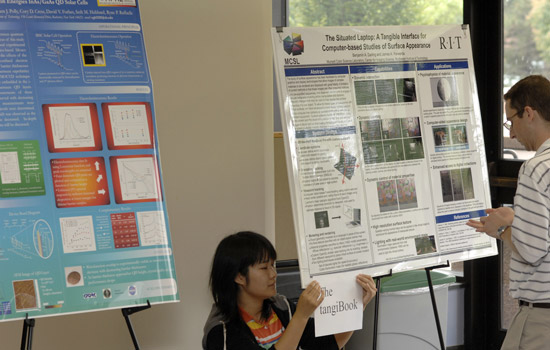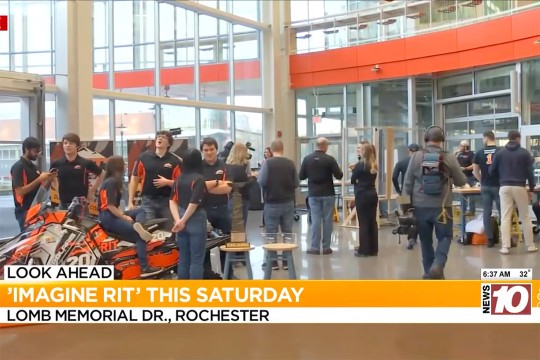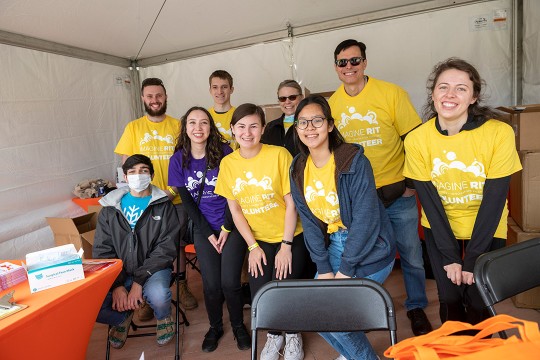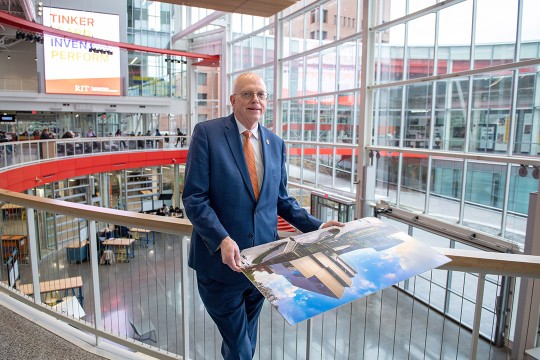Graduate students seize opportunity to present their research
RIT hosted First Graduate Research Symposium July 22
A. Sue Weisler
The tangibook (right) was among those on display at RIT's first Graduate Research Symposium. The poster, presented by Benjamin Darling, won the best poster award.
Austars Schnore, a principal engineer at GE Global Research, praised the caliber of research from graduate students at RIT’s first Graduate Research Symposium July 22 in the Louise Slaughter Building.
Schnore, who gave the symposium’s keynote address, was impressed by what he saw. “I would like to add my admiration to the quality and diversity of work I’ve seen today,” he said.
Master’s and Ph.D. students from nearly two dozen disciplines participated in the symposium. Students delivered presentations during two morning and two afternoon sessions. A broad range of research topics were covered from social networking, to developing a space weather alert system, to using design elements to help people with mental-health disorders, to analyzing the color of beer. There was also a poster presentation session.
The symposium drew more than 200 attendees.
“This was a very special occasion and the turnout was a clear testimony to our graduate programs,” says Andrew Moore, dean of RIT’s graduate studies. “This first-ever symposium was an exercise in self-discovery for our graduates. In the years ahead, graduate education and research will increasingly drive innovation here and contribute importantly to RIT’s success.”
Robert Manley, a Ph.D. candidate in microsystems engineering, served as the symposium chair. “The graduate students have been eager to present their work and the idea to hold a symposium came from them,” adds Manley. “The students’ response is a testament to the commitment that RIT graduate students have toward their work and their willingness to share it with the community at-large.”
Awards were given out for the top oral presentations and for best poster. The award for best overall presentation went to Ray Ptucha, a Ph.D. student in the B. Thomas Golisano College of Computing and Information Sciences, for his presentation, “Facial Pose Estimation Using a Symmetrical Feature Model.”
Other award winners:
- Best in Session 1: Heidi Purrington, master’s degree student in microelectronic engineering, “A Multi-Sensor MEMS Chip for Humidity, Temperature, Pressure and Light”
- Best in Session 2: May Arsenovic, Ph.D. student in the Chester F. Carlson Center for Imaging Science, “Use of Remote Sensing Data to Enhance the Performance of Hydrodynamic Simulation of a Partially Frozen Power Plant Cooling Lake”
- Best in Session 3: Stephen Polly, Ph.D. student in microsystems engineering, “Reduction of Power Loss Mechanisms in InAs/GaAS Qd Concentrator Solar Cell Grid Design”
- Best in Session 4: Roberta DiLeo, Ph.D. candidate in microsystems engineering, “Free-standing Semiconductor Carbon Nanotube Electrodes for Lithium Ion Batteries”
- Best Poster: Benjamin Darling, Ph.D. student in color science, “The tangibook: A Tangible Display System for Direct Interaction with Virtual Surfaces”
Schnore encouraged students to develop a curiosity and interest in a range of topics and find good mentors. He told the audience that one’s non-technical attributes are just as important as their technical knowledge.
“I was doing my job, but I was introverted in my activities,” said Schnore. “When I was assigned to teams of people with diverse areas of expertise it gave me a real thirst and passion to go out and talk to people. I went from being centered on my problems to focusing on other’s problems. That’s where the innovation occurs.”
Schnore has 20 years experience in semiconductors, power electronics, embedded systems and advanced computing. He is a technology leader in the Advanced Computing Laboratory at GE Global Research. He holds 13 patents in the areas of realtime and embedded controls.
RIT’s Office of Graduate Studies plans to make the symposium an annual event. To learn more about the symposium, visit the Office of Graduate Education Website.















